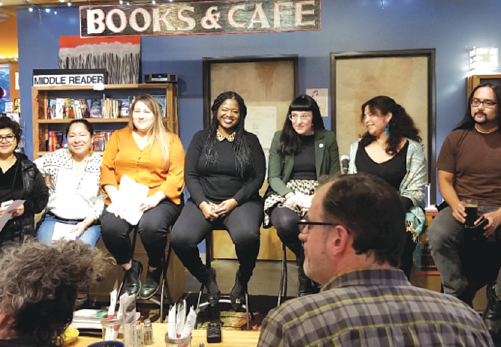OPINION NOTECultural Appropriation
“Folks want my rhythm but, they don’t want my blues,” that is how Sonya Hunte opened the Community Conversation about Cultural Appropriation last October. The phrase is referring to the picking and choosing parts of a culture without caring about the struggles of people inheritors of that culture. One example of cultural appropriation is what is happening with the Día de Muertos (Day of the Dead) tradition, where big corporations profit from selling mass-produced objects and “costumes” within the Halloween context. On the other hand, this Latin American celebration has become popular, and at the same time, the anti-immigrant sentiment against Latin Americans has grown. The message of “we want your culture, but we don’t want your people” is very harmful to everybody. Especially now, when immigrant families face dehumanizing policies that, in thousands of cases, have separated them and imprisoned their children.
The Día de Muertos is a celebration that invites the entire community, without distinction, to participate, the same way Death does not discriminate against anybody. It is a celebration with spiritual roots, such as the practice of yoga or Buddhism, which are not restricted to a specific type of people. However, when one is invited to participate, it is important to learn what the tradition is about, and what is a respectful way to engage and show solidarity with the heirs of that tradition. Dance to the rhythm, and be aware of the blues, care about the community with which you are participating. A great way to support is to appropriately and fairly buy a handmade Día de los Muertos artisan object from an indigenous person, this will allow you to know their community better. Melissa Shaginoff pointed out that one of the harmful effects of cultural appropriation in the indigenous and native communities is that it creates identity confusion, especially for the younger generations. Cultural appropriation is a colonialist way of deciding what parts of the culture are acceptable and which ones are not. This misrepresentation creates a simplified version of what is to be indigenous and makes it very difficult for the young natives to exercise and represent their own cultural heritage. E.J. David, a Filipino immigrant and University of Alaska professor, explained that one way of being an ally is to get out of the way, to not try to be a savior. Also, he said that to end this kind of contemporary oppression, one should let the members of the community lead and amplify their voices, and if one genuinely cares and wants to help, to be ready to risk one´s own privilege. Riva Symko mentioned that cultural appropriation is about power relations, and as a white settler who wants to be an ally, it is essential to step down of privilege and accept critic and listen. Finally, Lorena Medina reminded us of the importance of caring about the “living Indian” and not just glorifying the “dead Indian.” |
